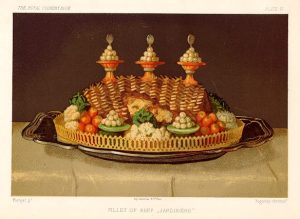Food history was never my area of specialization, but I’ve been thinking about it a lot lately. The trigger was a sales ad for an old cookbook that is again available for sale. Unfortunately I can’t remember the name, but it made me curious.

“Fillet of Beef ‘Jardiniere’ ” chromolithograph by Regamey after Ronjat, published in The Royal Cookery Book, about 1890. Photo from Ancestry Images
I had already noticed an explosion of interest in food and cooking in the last decade or two. This is evidenced by the number of television channels, television shows, magazines and books dedicated to this topic. I don’t often watch these shows, partly because I don’t really like to cook, and partly because when I do watch these shows I want to eat all the food.
I’m not sure why the increased interest, but that’s not what I want to discuss today. I may not like to cook, but I am fascinated by the glimpse into the past that food and food preparation provides. Food is a perfect example of how history is all around us, just waiting for us to be curious enough to pay attention and ask questions. After all, we all have to eat and sometimes the foods we choose are a representation of our cultural history.
I can’t think of anything that connects you to your history like food does. I have recipes that have passed down through my family. We have recipes in my family that have evolved with each new generation. Expanding from our family, there are the broader food traditions of our Scandinavian heritage. I love lefse, but don’t feel I am betraying my cultural heritage by refusing to eat lutefisk.
Food is not just food. There are cultural traditions, and generally concrete reasons why those traditions exist. For most of history people ate particular foods base on their availability. Their choices could depend upon whether they lived in the desert or the jungle, their economic status, what means they had to prepare or preserve the available food. Basically, our ancestors did not have the modern supermarket.
In researching food history this week, I’m amazed not only by the amount of information available, but the categories you can use for organization. Do you want to learn more about food from a particular country or region? Do you want to recreate recipes from the past using equipment and tools similar to those used at the time? Do you want to know what foods were eaten by a particular class during a particular time period? Are you interested in the rituals involved in planning, preparing and consuming a meal? No matter your specific interest in food history, there appears to be something for everyone.
My first search was for books and I was surprised by the number and variety available about the history of food. If you want more in depth information, do a search for “food history” at your favorite bookselling website. There is everything from the specific to the general. I can personally recommend Salt: A World History by Mark Kurlansky.
If you are interested in the historical aspects of food, my first recommendation would be to visit The Food Timeline. This site was created by a reference librarian and launched in 1999. I’m glad I took the time to read through the About This Site section where the resources are explained. The first entry is ice and water and it continues to Cronuts in 2013. Just looking at the dates is fascinating, but you can click on any link to learn more about each food. Be aware that there are more citations and links within the topic if you want to learn even more. I couldn’t resist clicking into horseradish and kimchi and Viking Foods. Check it out and see what interests you, but I give you fair warning that this is one of those websites where you can quickly lose track of time.
I’ll leave you with some blogs you may want to visit. I’ve included a variety and hope you find something you didn’t know you wanted to know.
The Old Foodie – A food history story and recipe every weekday of the year
Rachel Laudan – A Historian’s Take on Food and Food Politics
Food and History – Indiana Jonesing for the things we eat
Historic Cookery – Adventures in late 18th & early 19th Century foodways
Researching Food History – Cooking and Dining
As always, please feel free to comment. I’d love to hear about your food history.
